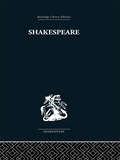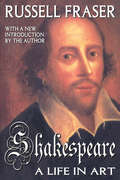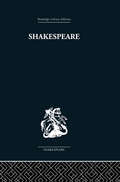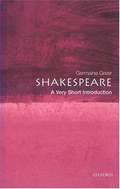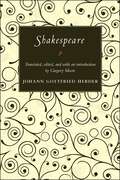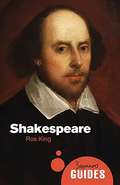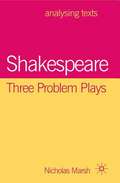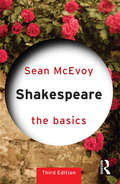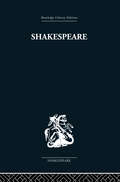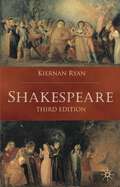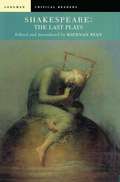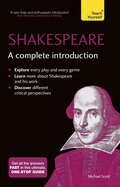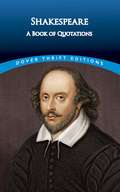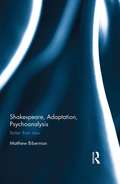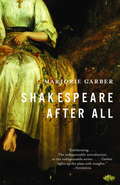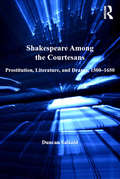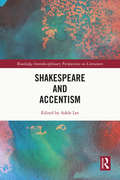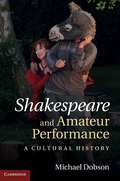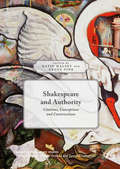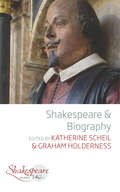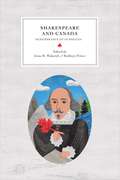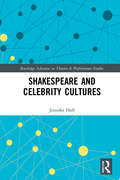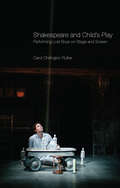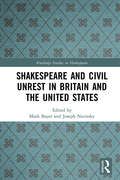- Table View
- List View
Shakespeare: The Dark Comedies to the Last Plays: from satire to celebration (Shakespeare Survey Ser. #44)
by R A FoakesFirst published in 1971. This volume explains and analyses the last plays of Shakespeare as dramatic structures. Beginning from the dark comedies, the author describes the ways in which Shakespeare was affected by the new techniques and possibilities for drama opened up by the innovations of the years after 1600, notably by the rise in children's companies. The main line of development of Shakespeare's dramatic skills is shown as leading from the dark comedies, through the late tragedies, to the last plays. A major part of the book is devoted to analyses of Cymbeline, The Winter's Tale, The Tempest and King Henry VIII.
Shakespeare: A Life in Art
by Russell FraserShakespeare: A Life in Art brings together in a single volume Fraser's previously published two-volume biography (Young Shakespeare, 1988, and Shakespeare: The Later Years, 1992). This volume includes a new introduction, which looks back on the author's lifelong commitment to Shakespeare's work and seeks to find the pattern in his carpet.Fraser's approach places Shakespeare's work first but shows how the life and art interpenetrate, like the yolk and white of one shell. What Shakespeare was doing in Stratford and London underlies what he was writing, or more exactly, the two flow together. Most of the book is devoted to Shakespeare the man and artist, but it simultaneously throws light on his literary and personal relations with contemporaries such as Jonson, Marlowe, and others known as the University Wits. His experience as an actor and man of theater is absorbingly recounted here, as well as his relations to well-born patrons like the Earl of Southampton and Henry Carey, Lord Hunsdon (England's Lord Chamberlain). In 1603 when James I ascended the throne, the Chamberlain's Men became the King's Men, passing under the sovereign's protection. How Shakespeare responded to his ambiguous role--he was both servant to the great and their remorseless critic--is another of Fraser's subjects. In short, Fraser's principal purpose is to advance our understanding of Shakespeare, at the same time throwing light on the work of the man who of all modern, and perhaps ancient poets had the largest and most comprehensive soul. John Dryden, Shakespeare's first great critic, said that, and Fraser tries to estimate what he meant.
Shakespeare: The art of the dramatist (Princeton Legacy Library #1782)
by Roland Mushat FryeThis edition first published in 1982. Previous edition published in 1972 by Houghton Mifflin. Outlining methods and techniques for reading Shakespeare's plays, Roland Frye explores and develops a comprehensive understanding of Shakespeare's drama, focussing on the topics which must be kept in mind: the formative influence of the particular genre chosen for telling a story, the way in which the story is narrated and dramatized, the styles used to convey action, character and mood, and the manner in which Shakespeare has constructed his living characterizations. As well as covering textual analysis, the book looks at Shakespeare's life and career, his theatres and the actors for whom he wrote and the process of printing and preserving Shakespeare's plays. Chapters cover: King Lear in the Renaissance; Providence; Kind; Fortune; Anarchy and Order; Reason and Will; Show and Substance; Redemption and Shakespeare's Poetics.
Shakespeare: A Very Short Introduction
by Germaine GreerA clear introduction to Shakespeare's plays, this volume examines them in detail and shows how Shakespeare dramatized moral and intellectual issues in such a way that his audience became dazzlingly aware of an imaginative dimension to daily life. Germaine Greer argues that as long as Shakespeare's work remains central to English cultural life, it will retain the values which make it unique in the world.
Shakespeare
by Johann Gottfried HerderWithout Johann Gottfried Herder (1744–1803), we simply would not understand Shakespeare in the way we do. In fact, much literature and art besides Shakespeare would neither look the same nor be the same without the influence of Herder's "Shakespeare" (1773). One of the most important and original works in the history of literary criticism, this passionate essay pioneered a new, historicist approach to cultural artifacts by arguing that they should be judged not by their conformity to a set of conventions imported from another time and place, but by the effectiveness of their response to their own historical and cultural context. Rejecting the authority of a dominant and stifling French neoclassicism that judged eighteenth-century plays by the criteria of Aristotle, Herder's "Shakespeare" signaled a break with the Enlightenment, the approach of Romanticism, and the arrival of a distinctly modern form of aesthetic appreciation.With a vivid new translation and a fascinating introduction by Gregory Moore, this edition of Herder's classic will speak to today's readers with undiminished power and persuasiveness.
Shakespeare: A Beginner's Guide (Beginner's Guides)
by Ros KingWhether the fault of tedious teachers or hammy actors, Shakespeare is often seen as dry and impenetrable. In this fast-paced introduction, Ros King sets out to remind us of the sheer beauty and sophistication that can make Shakespeare's works a joy for any audience. Exploring his invention, wit, along with his uncanny characterisation, King argues archaic language should be no barrier to the modern reader. With summaries of The Bard's life and background, explanations of the plays' origins and instructions on how to read his poetry, Shakespeare: A Beginner's Guide provides all the tools the general reader needs to embrace the greatest writer in the English language.
Shakespeare: Three Problem Plays (Analysing Texts Ser.)
by Nicholas MarshWritten in 1602-4, between Hamlet and the other great tragedies, Shakespeare's three Problem Plays are so called because they do not fit easily into the other groups of plays. They are awkward dramas, full of unresolved controversies, which leave audiences and readers unsettled by contradictory responses. Nicholas Marsh uses close analysis of extracts from the plays to explore how Shakespeare maintains competing discourses within a single text. In the first part of his study, Marsh highlights the multiple interpretations these plays provoke and provides useful sections on methods of analysis to encourage readers to develop their views independently. The second part of the book discusses the Problem Plays in relation to the playwright's other works, and examines their cultural and historical contexts. A comparison of five modern critical views and helpful suggestions for further reading provide a bridge to continuing study. In this essential guide to a complex set of plays, Marsh does not seek to reconcile the thorny issues these dramas leave open: rather, he equips the reader with the necessary critical tools to fashion their own synthesis.
Shakespeare: The Basics (The Basics)
by Sean McEvoyNow in its third edition Shakespeare: The Basics is an insightful and informative introduction to the work of William Shakespeare. Exploring all aspects of Shakespeare’s plays including the language, cultural contexts, and modern interpretations, this text looks at how a range of plays from across the genres have been understood. Updates in this edition include: Ecocritical, queer, presentist and gendered discussions of Shakespeare’s work Studies of new performances including Tennant and Tate’s Much Ado About Nothing Critical discussions of race and politics in Othello and King Lear Case studies of modern film versions of Shakespeare’s works A chronology of Shakespeare’s work and contemporary events With fully updated further reading throughout and a wide range of case studies and examples, this text is essential reading for all those studying Shakespeare’s work.
Shakespeare (Shakespeare Survey Ser. #Series Number 7)
by Allardyce NicollFirst published in 1952. An invaluable introduction to Shakespeare, this book places Shakespeare's work and criticism against the background of Elizabethan life in its historical, social, political, religious, linguistic and literary aspects. Contents include: The Problem of Interpretation; Shakespeare at Work; Man and Society; Man and the Universe; The Inner Life.
Shakespeare
by Kiernan RyanFirst published in 1989, this 3rd edition, a critical study of Shakespeare, has been revised, updated and expanded with new material, so it is twice the size of the first edition. The section on Shakespearean comedy now includes an essay on Shakespeare's first scintillating experiment in the genre, The Comedy of Errors, and a study of his most perplexing problem play, Measure for Measure. ; A new last chapter, ' Dreaming on things to come - Shakespeare and the Future of Criticism, reveals how much modern criticism can learn from the appropriation of Shakespeare by Oscar Wilde, George Bernard Shaw and James Joyce
Shakespeare: The Last Plays (Longman Critical Readers)
by Kiernan RyanThis is the first collection of criticism on Shakespeare's romances to register the impact of modern literary theory on interpretations of these plays. Kiernan Ryan brings together the most important recent essays on Pericles, Cymbeline, The Winter's Tale and The Tempest, the greatest of the `last plays', staging a dynamic debate between feminist, poststructuralist, psychoanalytic and new historicist views of the masterpieces Shakespeare wrote at the close of his career.The book aims not only to anthologise accounts of the last plays by leading Shakespearean critics, including Stephen Greenblatt, Janet Adelman, Leah Marcus, Howard Felperin and Steven Mullaney, but also to dramatise what is at stake in the choice of a particular critical approach. It allows the student to compare the strengths and limitations of a deconstructive and a feminist reading of the same romance, or to test the plausibility of one psychoanalytic angle on the last plays against another. The headnotes that preface the essays highlight their distinctive slants on Shakespearean romance, unpack the theoretical assumptions that steer their interpretations, and throw into relief the key points at which their authors collide or converge.The editor's introduction places the essays in the context of twentieth-century criticism of the last plays and makes a powerful case for a fundamental reappraisal of Shakespearean romance. The comprehensive, fully annotated bibliography provides an unrivalled guide to further reading on all four plays.
Shakespeare: A Complete Introduction
by Michael ScottWritten by an academic and literary scholar with decades of experience in teaching Shakespeare to students at all levels, Shakespeare: A Complete Introduction is designed to give you everything you need to succeed, all in one place. It covers the key themes and critical concepts that students are expected to be confident in, outlining the ideas in clear jargon-free English, and then providing added-value features like key quotes, chapter recap sections, and even lists of questions you might be asked in your seminar or exam.The book organizes Shakespeare's work by genre and theme, in order to look closely at the individual plays. It opens with contextualizing information about the original texts, language usage, and how the plays were performed. The book is then grouped into the genres of early and romantic Comedies, Tragedies, Problem Plays, and the Histories. Each chapter will focus on one or two key plays, and foreground the themes and preoccupations that surround critical work on those plays. Throughout the book there will be an emphasis on the historical vs the contemporary approach, and the distinctions between literary and theatrical competencies.
Shakespeare: A Book of Quotations (Dover Thrift Editions Ser. #Vol. 7)
by William ShakespeareShakespeare is without doubt the most quoted writer in English. His plays and poems comprise an inexhaustible source of memorable and often profound thoughts beautifully and concisely expressed. This remarkably affordable volume presents over 400 quotations conveniently arranged by topic: love, marriage, conduct and morality, truth, beauty, time, death, music, and more.Included are such timeless observations as: "All that glitters is not gold," "Brevity is the soul of wit," "How sharper than a serpent's tooth it is/ To have a thankless child"; "While you live, tell truth and shame the devil!"; "The very substance of the ambitious is merely the shadow of a dream," and many more. Romantic thoughts receive a particularly rich treatment; extensive selections on the subject of love include quotes from the plays ("The course of true love never did run smooth"; "Speak low if you speak love") and sonnets ("For thy sweet love remember'd such wealth brings,/ That then I scorn to change my state with kings"). Each quote bears a complete citation.Ideal for writers, speakers, students of literature, and any lover of Shakespeare's works, this inexpensive treasury lends itself admirably to a virtually endless number of uses, from casual browsing to designing personal greeting cards.
Shakespeare, Adaptation, Psychoanalysis: Better than New
by Matthew BibermanIn Shakespeare, Adaptation, Psychoanalysis, Matthew Biberman analyzes early adaptations of Shakespeare’s plays in order to identify and illustrate how both social mores and basic human psychology have changed in Anglo-American culture. Biberman contests the received wisdom that Shakespeare’s characters reflect essentially timeless truths about human nature. To the contrary, he points out that Shakespeare’s characters sometimes act and think in ways that have become either stigmatized or simply outmoded. Through his study of the adaptations, Biberman pinpoints aspects of Shakespeare’s thinking about behavior and psychology that no longer ring true because circumstances have changed so dramatically between his time and the time of the adaptation. He shows how the adaptors’ changes reveal key differences between Shakespeare’s culture and the culture that then supplanted it. These changes, once grasped, reveal retroactively some of the ways in which Shakespeare’s characters do not act and think as we might expect them to act and think. Thus Biberman counters Harold Bloom’s claim that Shakespeare fundamentally invents our sense of the human; rather, he argues, our sense of the human is equally bound up in the many ways that modern culture has come to resist or outright reject the behavior we see in Shakespeare’s plays. Ultimately, our current sense of 'the human' is bound up not with the adoption of Shakespeare’s psychology, perhaps, but its adaption-or, in psychoanalytic terms, its repression and replacement.
Shakespeare After All
by Marjorie GarberIn this text for scholars and general readers, Garber (English, Harvard U. ) considers the language, characters, and themes in the plays of William Shakespeare. Individual readings examine each of the 38 plays in chronological sequence, allowing the reader to trace Shakespeare's development as a writer and creator of dramatic scenarios. The volume also includes listings of film adaptations, an extensive bibliography, and background information on Shakespeare's life and times. Annotation ©2004 Book News, Inc. , Portland, OR (booknews. com)
Shakespeare, Alchemy and the Creative Imagination
by Margaret HealyShakespeare's Sonnets and A Lover's Complaint constitute a rich tapestry of rhetorical play about Renaissance love in all its guises. A significant strand of this is spiritual alchemy: working the 'metal' of the mind through meditation on love, memory work and intense imagination. Healy demonstrates how this process of anguished soul work - construed as essential to inspired poetic making - is woven into these poems, accounting for their most enigmatic imagery and urgency of tone. The esoteric philosophy of late Renaissance Neoplatonic alchemy, which embraced bawdy sexual symbolism and was highly fashionable in European intellectual circles, facilitated Shakespeare's inscription of an interior drama of a desiring mind creating poetry. Arguing that Shakespeare's incorporation of alchemical textures throughout his late works is indicative of an artistic stance promoting religious toleration and unity, this book sets out a crucial new framework for interpreting the 1609 poems, and transforms our understanding of Shakespeare's art.
Shakespeare Among the Courtesans: Prostitution, Literature, and Drama, 1500-1650 (Anglo-Italian Renaissance Studies)
by Duncan SalkeldCourtesans - women who achieve wealth, status, or power through sexual transgression - have played both a central and contradictory role in literature: they have been admired, celebrated, feared, and vilified. This study of the courtesan in Renaissance English drama focuses not only on the moral ambivalence of these women, but with special attention to Anglo-Italian relations, illuminates little known aspects of their lives. It traces the courtesan from a wry comedic character in the plays of Terence and Plautus to its literary exhaustion in the seventeenth-century dramatic works of Dekker, Marston, Webster, Middleton, Shirley and Brome. The author focuses especially on the presentation of the courtesan in the sixteenth century - dramas by Shakespeare, Marlowe, and Lyly view the courtesan as a symbol of social disease and decay, transforming classical conventions into English prejudices. Renaissance Anglo-Italian cultural and sexual relations are also investigated through comparisons of travel narratives, original source materials, and analysis of Aretino's representations of celebrated Italian courtesans. Amid these fascinating tales of aspiration, desire and despair lingers the intriguing question of who was the 'dark lady' of Shakespeare's sonnets.
Shakespeare and Accentism (Routledge Interdisciplinary Perspectives on Literature)
by Adele LeeThis collection explores the consequences of accentism—an under-researched issue that intersects with racism and classism—in the Shakespeare industry across languages and cultures, past and present. It adopts a transmedia and transhistorical approach to a subject that has been dominated by the study of "Original Pronunciation." Yet the OP project avoids linguistically "foreign" characters such as Othello because of the additional complications their "aberrant" speech poses to the reconstruction process. It also evades discussion of contemporary, global practices and, underpinning the enterprise, is the search for an aural "purity" that arguably never existed. By contrast, this collection attends to foreign speech patterns in both the early modern and post-modern periods, including Indian, East Asian, and South African, and explores how accents operate as "metasigns" reinforcing ethno-racial stereotypes and social hierarchies. It embraces new methodologies, which includes reorienting attention away from the visual and onto the aural dimensions of performance.
Shakespeare and Amateur Performance
by Michael DobsonFrom the Hamlet acted on a galleon off Africa to the countless outdoor productions of A Midsummer Night's Dream that now defy each English summer, Shakespeare and Amateur Performance explores the unsung achievements of those outside the theatrical profession who have been determined to do Shakespeare themselves. Based on extensive research in previously unexplored archives, this generously illustrated and lively work of theatre history enriches our understanding of how and why Shakespeare's plays have mattered to generations of rude mechanicals and aristocratic dilettantes alike: from the days of the Theatres Royal to those of the Little Theatre Movement, from the pioneering Winter's Tale performed in eighteenth-century Salisbury to the Merchant of Venice performed by Allied prisoners for their Nazi captors, and from the how-to book which transforms Mercutio into Yankee Doodle to the Napoleonic counterspy who used Richard III as a tool of surveillance.
Shakespeare and Authority
by Katie Halsey Angus VineThis book examines conceptions of authority for and in Shakespeare, and the construction of Shakespeare as literary and cultural authority. The first section, Defining and Redefining Authority, begins by re-defining the concept of Shakespeare's sources, suggesting that 'authorities' and 'resources' are more appropriate terms. Building on this conceptual framework, the remainder of this section explores linguistic and discursive authority more broadly. The second section, Shakespearean Authority, considers the construction, performance and questioning of authority in Shakespeare's plays. Essays here range from examinations of monarchical authority to discussions of household authority, literary authority and linguistic ownership. The final part, Shakespeare as Authority, then traces the increasing establishment of Shakespeare as an authority from the eighteenth to the twenty-first century in a series of essays that explore Shakespearean authority for editors, actors, critics, authors, readers and audiences. The volume concludes with two essays that reassess Shakespeare as an authority for visual culture - in the cinema and in contemporary art.
Shakespeare and Biography (Shakespeare & #8)
by Katherine Scheil Graham HoldernessFrom Shakespeare’s religion to his wife to his competitors in the world of early modern theatre, biographers have approached the question of the Bard’s life from numerous angles. Shakespeare & Biography offers a fresh look at the biographical questions connected with the famous playwright’s life, through essays and reflections written by prominent international scholars and biographers.
Shakespeare and Canada: Remembrance of Ourselves (Reappraisals: Canadian Writers)
by Annie Brisset Richard Cavell Dana Colarusso Daniel Fischlin Troni Grande Peter Kuling Sarah Mackenzie C. E. McGee Don Moore Ian Rae Tom Scholte Kailin WrightShakespeare in Canada is the result of a collective desire to explore the role that Shakespeare has played in Canada over the past two hundred years, but also to comprehend the way our country’s culture has influenced our interpretation of his literary career and heritage. What function does Shakespeare serve in Canada today? How has he been reconfigured in different ways for particular Canadian contexts? The authors of this book attempt to answer these questions while imagining what the future might hold for William Shakespeare in Canada. Covering the Stratford Festival, the cult CBC television program Slings and Arrows, major Canadian critics such as Northrop Frye and Marshall McLuhan, the influential acting teacher Neil Freiman, the rise of Québécois and First Nation approaches to Shakespeare, and Shakespeare’s place in secondary schools today, this collection reflects the diversity and energy of Shakespeare’s afterlife in Canada. Collectively, the authors suggest that Shakespeare continues to offer Canadians “remembrance of ourselves.” This is a refreshingly original and impressive contribution to Shakespeare studies—a considerable achievement in any work on the history of one of the central figures in the western literary canon.
Shakespeare and Celebrity Cultures (Routledge Advances in Theatre & Performance Studies)
by Jennifer HollThis book argues that Shakespeare and various cultures of celebrity have enjoyed a ceaselessly adaptive, symbiotic relationship since the final decade of the sixteenth century, through which each entity has contributed to the vitality and adaptability of the other. In five chapters, Jennifer Holl explores the early modern culture of theatrical celebrity and its resonances in print and performance, especially in Shakespeare’s interrogations of this emerging phenomenon in sonnets and histories, before moving on to examine the ways that shifting cultures of stage, film, and digital celebrity have perpetually recreated the Shakespeare, or even the #shakespeare, with whom audiences continue to interact. Situated at an intersection of multiple critical conversations, this book will be of great interest to scholars and graduate students of Shakespeare and Shakespearean appropriations, early modern theater, and celebrity studies.
Shakespeare and Child's Play: Performing Lost Boys on Stage and Screen
by Carol Chillington RutterShakespeare wrote more than fifty parts for children, amounting to the first comprehensive portrait of childhood in the English theatre. Focusing mostly on boys, he put sons against fathers, servants against masters, innocence against experience, testing the notion of masculinity, manners, morals, and the limits of patriarchal power. He explored the nature of relationships and ideas about parenting in terms of nature and nurture, permissiveness and discipline, innocence and evil. He wrote about education, adolescent rebellion, delinquency, fostering, and child-killing, as well as the idea of the redemptive child who ‘cures’ diseased adult imaginations. ‘Childness’ – the essential nature of being a child – remains a vital critical issue for us today. In Shakespeare and Child’s-Play Carol Rutter shows how recent performances on stage and film have used the range of Shakespeare’s insights in order to re-examine and re-think these issues in terms of today’s society and culture.
Shakespeare and Civil Unrest in Britain and the United States (Routledge Studies in Shakespeare)
by Mark BayerShakespeare and Civil Unrest in Britain and the United States extends the growing body of scholarship on Shakespeare’s appropriation by examining how the plays have been invoked during periods of extreme social, political, and racial turmoil. How do the ways that Shakespeare is adapted, studied, and discussed during periods of civil conflict differ from wars between nations? And how have these conflicts, in turn, affected how Shakespeare has been understood in these two countries that, more than any others, continue to be deeply shaped by Shakespeare’s complex, enduring, and multivalent legacy? The essays in this volume collectively disclose a fascinating genealogy of how Shakespeare became a dynamic presence in factional discourse and explore the "war of words" that has accompanied civil wars and other instances of domestic disturbance. Whether as part of violent confrontations, mutinies, rebellions, or within the universal struggle for civil rights, Shakespeare’s repeated appearance during such turbulent moments is more than mere historical coincidence. Rather, its inflections on the contested meanings of citizenship, community, and political legitimacy demonstrate the generative influence of the plays on our understanding of internecine strife in both countries.
